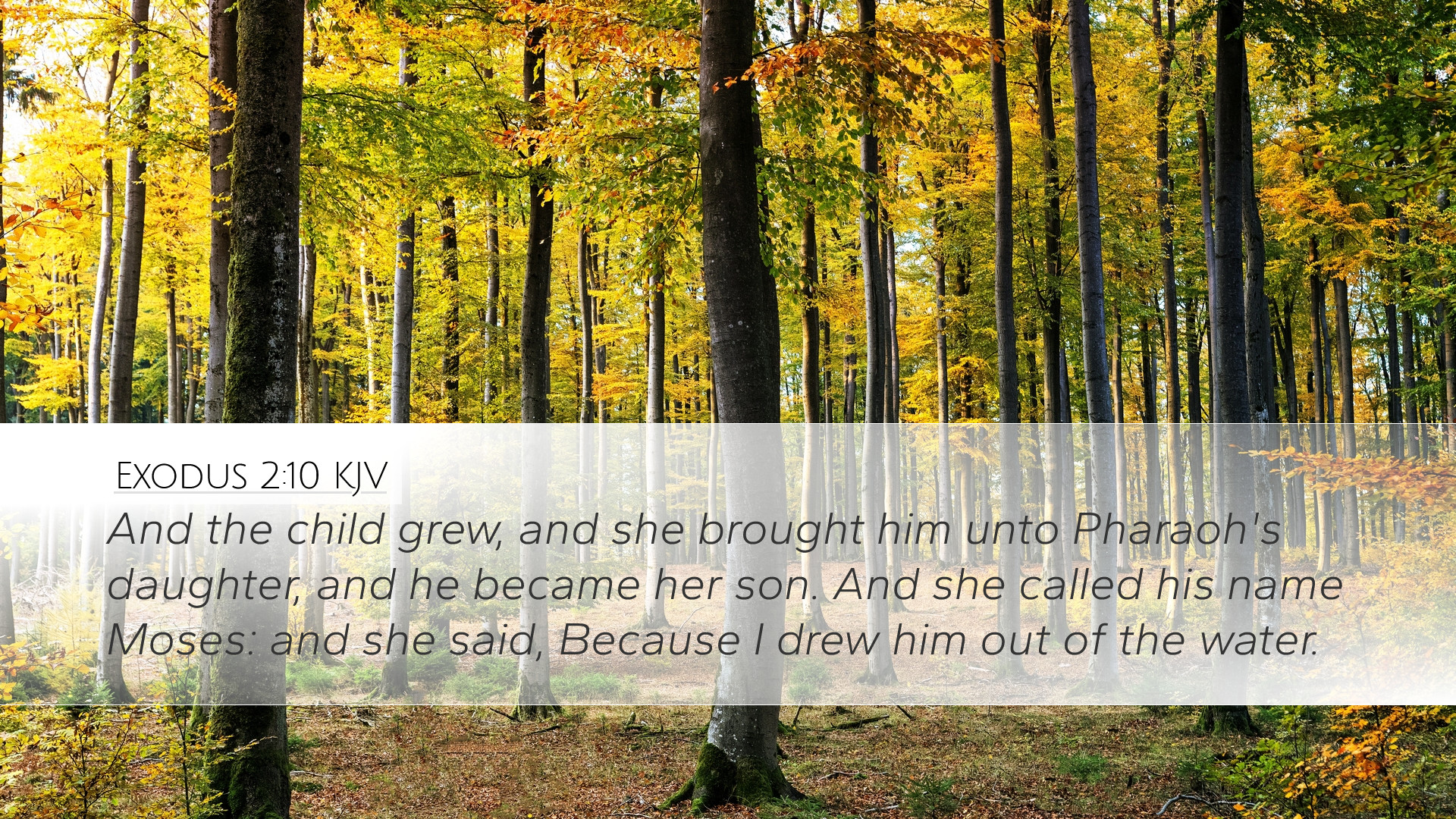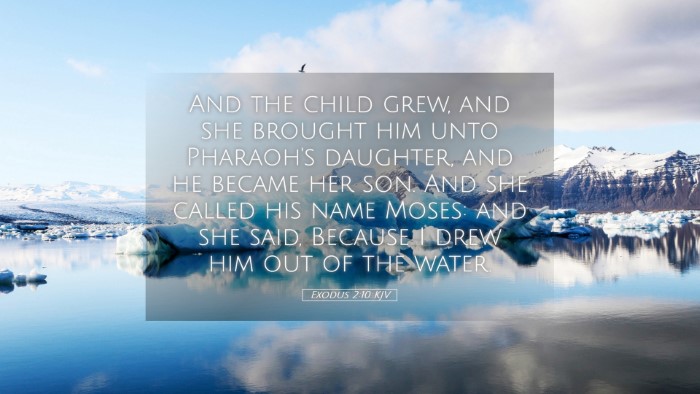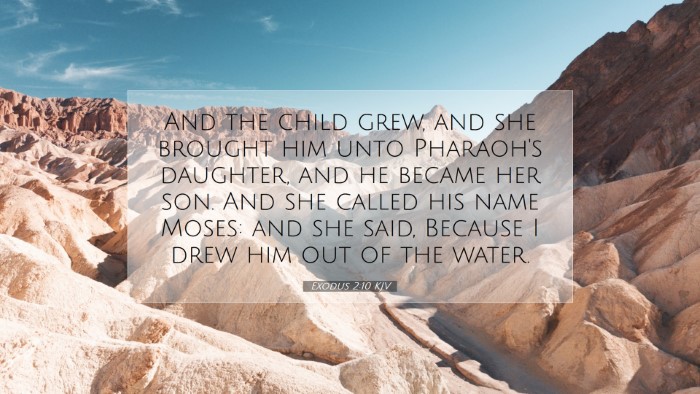Commentary on Exodus 2:10
Verse: "And the child grew, and she brought him unto Pharaoh's daughter, and he became her son. And she called his name Moses: and she said, Because I drew him out of the water."
Introduction
Exodus 2:10 marks a significant turning point in the narrative of Moses' life, illustrating themes of deliverance, identity, and purpose. This verse encapsulates the duality of Moses' origins—his Hebrew heritage and his Egyptian upbringing. The commentaries from Matthew Henry, Albert Barnes, and Adam Clarke provide intricate insights into the implications of this verse, which speak volumes to pastors, students, theologians, and scholars alike.
Moses’ Growth and Adoption
Matthew Henry emphasizes the transition of Moses from a Hebrew child in peril to being raised in the royal household of Pharaoh. He points out the divine orchestration behind Moses' adoption, illustrating that even in dire circumstances, God's providence prevails. This circumstance not only saves Moses from death but positions him to be instrumental in the deliverance of Israel.
Albert Barnes elaborates on the phrase "the child grew," indicating that this growth involves not only physical maturation but also spiritual and intellectual development under the watchful eye of Pharaoh’s daughter. Barnes asserts that this unique environment would equip Moses with knowledge of Egyptian culture, language, and governance, which would later be pivotal in his leadership role as the deliverer of Israel.
Adam Clarke discusses the significance of Moses’ name. The name 'Moses' itself, derived from the Egyptian word meaning 'to draw out', symbolizes his rescue from the waters of the Nile. Clarke notes that this name is prophetic, foreshadowing how Moses would eventually 'draw out' the Israelites from bondage in Egypt. He further analyzes how such naming practices were common in biblical narratives, often carrying deeper meanings linked to the person’s destiny.
Theological Significance
The verse encapsulates profound theological implications, particularly regarding God’s sovereignty and purpose. All three commentators highlight God's hand in the events surrounding Moses’ life, suggesting that Moses’ position in Pharaoh’s palace was part of a divine plan to equip him for future leadership. God’s providence is evident throughout the narrative, suggesting that no situation, however dire, is beyond His control.
Matthew Henry remarks on the transformative power of God’s providence. He asserts that God can use the most unlikely circumstances to execute His will, thus encouraging believers to trust in divine plans even when circumstances appear bleak. This belief can be an anchor for faith community leaders as they navigate challenging situations.
Albert Barnes points out that the dual identity of Moses—being Egyptian by nurture while being Hebrew by birth—mirrors the complexities of cultural integration faced by many believers today. His commentary encourages readers to explore their identities and how God might be using them for His purposes amidst diverse backgrounds.
Adam Clarke emphasizes the aspect of divine calling that emerges from this narrative. He asserts that God’s calling often comes through unassuming beginnings. This perspective serves as an encouragement for pastors and leaders to recognize that influential callings can arise from humble beginnings, reflecting the biblical principle that God often chooses the weak things of the world to confound the mighty (1 Corinthians 1:27).
Practical Applications
From this verse, several practical applications can be drawn for both personal and communal reflection. As we discern the implications of Moses' early years, we gain insights into how God works through our lives today.
- Cultural Engagement: Like Moses, believers are often placed in contexts that require engagement with multiple cultures. Understanding one’s cultural identity and purpose in a diverse world can lead to effective ministry and transformational leadership.
- Trust in Divine Providence: The story of Moses encourages individuals to trust that God can bring about His plans even in challenging circumstances. This trust should inspire resilience among church leaders and their congregations.
- Recognizing Potential: Just as Pharaoh’s daughter recognized the potential in Moses, church leaders should seek to identify and nurture the gifts in those around them, believing that God can use anyone for His glory.
- Embracing Unique Identities: Moses’ life reminds believers to embrace their unique backgrounds, experiences, and identities as part of God’s plan. This understanding fosters inclusivity and unity within the body of Christ, acknowledging that diverse paths lead to a common vision.
Conclusion
Exodus 2:10 serves as a profound lens through which to view the life of Moses, framed by themes of deliverance, identity, and purpose. Insights from respected commentators like Matthew Henry, Albert Barnes, and Adam Clarke unveil the rich layers of meaning contained within this verse, reminding readers of God's sovereignty and the potential of each individual. As pastors, theologians, and scholars meditate on this text, they are called to be pertinent instruments in God’s redemptive narrative, recognizing that each life holds divine purpose crafted by the Creator.


